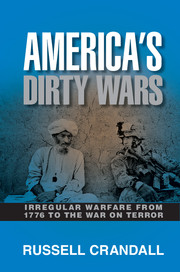Book contents
- Frontmatter
- Dedication
- Contents
- List of Figures
- Acknowledgments
- 1 Introduction
- 2 Irregular Warfare 101
- Part One The American Revolution to Chasing Sandino, 1776–1930s
- Part Two The Cold War, 1940s–1989
- Part Three Latin America and the Cold War, 1950s–1980s
- Part Four Post–Cold War, 1990s–2000s
- 26 Dirty Wars after the Cold War
- 27 Colombia
- 28 Iraq
- 29 Intermezzo
- 30 Post-9/11 COIN in the Philippines
- 31 Intermezzo
- 32 The Longest War
- 33 The Fall of Muammar Qaddafi, 2011
- 34 Intermezzo
- 35 Conclusion
- Epilogue “I Feel More Like a Monster”
- Notes
- Bibliography
- Index
35 - Conclusion
Published online by Cambridge University Press: 05 July 2014
- Frontmatter
- Dedication
- Contents
- List of Figures
- Acknowledgments
- 1 Introduction
- 2 Irregular Warfare 101
- Part One The American Revolution to Chasing Sandino, 1776–1930s
- Part Two The Cold War, 1940s–1989
- Part Three Latin America and the Cold War, 1950s–1980s
- Part Four Post–Cold War, 1990s–2000s
- 26 Dirty Wars after the Cold War
- 27 Colombia
- 28 Iraq
- 29 Intermezzo
- 30 Post-9/11 COIN in the Philippines
- 31 Intermezzo
- 32 The Longest War
- 33 The Fall of Muammar Qaddafi, 2011
- 34 Intermezzo
- 35 Conclusion
- Epilogue “I Feel More Like a Monster”
- Notes
- Bibliography
- Index
Summary
Nowadays, everyone calls himself a counterinsurgency expert.
– U.S. Special Forces generalGeorges Clemenceau is reputed to have said (and perhaps he did) that war was too important to be left to soldiers. Nobody seems to have come forward with the obvious corollary, which is that peace is too precious to be left to politicians. Such aphorisms, while they may delight those who like their thinking supplied for them in tasty capsules, wholly over-simplify the complex problem with which they deal. They can be true, certainly, but at the same time they are nonsense.
– Counterinsurgency expert, 1961“The Kinds of Wars We Must Master”
When the Iraq War was still raging in 2006, General Petraeus wrote in the U.S. Army’s Military Review that his forces had learned a tremendous amount in Iraq and Afghanistan about how to fight guerrilla insurgencies, but the United States military needed to continue to learn from those conflicts because “America’s overwhelming conventional military superiority makes it unlikely that future enemies will confront us head on.” The vaunted American commander conceded that these two insurgencies were not the “wars for which we were best prepared in 2001; however, they are the wars we are fighting and they clearly are the kinds of wars we must master.” Petraeus soberly reminded his soldiers that a “liberating force must act quickly, because every Army of liberation has a half-life beyond which it turns into an Army of occupation.”
While he referred only to the two major dirty wars that the United States was engaged in at the time, Petraeus could equally have been talking about American involvement in the Philippines after 1898, the chases after Augusto Sandino in Nicaragua in the late 1920s and early 1930s or Pancho Villa in northern Mexico in 1916, or Vietnam sixty years later.
- Type
- Chapter
- Information
- America's Dirty WarsIrregular Warfare from 1776 to the War on Terror, pp. 467 - 470Publisher: Cambridge University PressPrint publication year: 2014



